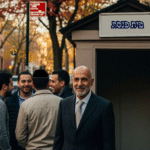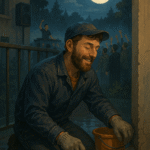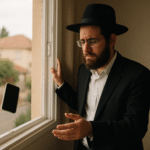“Apple orchard–style burger!” the waitress shouted.
“Coming right up,” he said.
“And no lettuce!”
“Okay, I heard you.”
It was the fiftieth burger he’d made that evening. The plan—to open an “authentic” burger joint in the middle of an abandoned Vermont farm—had seemed like a bad joke until it worked. Burned out by New York and Los Angeles, the young chef had decided to disappear and rebuild. He spent months perched on recipes, touring upscale temples and greasy spoons, learning what crowds love and how to give them the same thing with a single, precise twist—the one change that would make him stand out.
He found the farm by accident. Locals told him about a peculiar orchard run by a mysterious man who sold apples only on Mondays, for exactly one hour. Miss the window, and you waited a week. The stunt made him famous, but not solvent. When he was caught selling bags of apples out the back door on a Wednesday at midnight, the story popped like a balloon. He sank into a dark silence, abandoned the orchard, and declared the place open to anyone who wanted it.
By the time the chef showed up, a week of scavengers had stripped most of the trees. What remained was a small, old-fashioned farmhouse. Over a few beers and a drifting conversation about life and the meaning of apples, the orchard owner slid a key across the table. Payment was simple: a free burger whenever he passed through. That was enough for the old place.
A month of hard, solitary work—just a drill, paint, and stubbornness—turned the house into a space that was a little gloomy but clean, organized, and hungry for purpose. Another month to hunt down tables, mismatched chairs, and frames for the walls; to coax the kitchen into life. Money dwindled to fumes. The chef knew he had a week of air.
He took out his small notebook, read the recipes again, and charged. He recruited the waitress after watching her at a convenience store, where she poured a coffee and drew a butterfly in the foam. The wind did the rest. Ten people on day one. Fifteen on day two. By day three, there wasn’t a seat left.
A legend sprouted, like the old tale of the Monday-hour orchard. Now it was the miracle burger cooked by the strange man who built the restaurant himself. The burger held a tangle of flavors. He refused to list them. He barely spoke to customers at all. Partly, it was marketing—I know something you don’t. Mostly, it was him. He didn’t want to be their friend. He didn’t want to wear the host’s smile. He wanted to make the burger.
“There are smoked peppers,” one regular said, leaning over his plate. “Japanese mushrooms, an Indian spice, and date honey. A few other things I can’t place.” It was the closest anyone had come. The chef heard it and felt a flicker of alarm. Half the puzzle was on the table. When the guesser looked up, fishing for confirmation, the chef turned away.
The man stared, eyes narrowing. “I know you won’t confirm anything,” he said. “But there’s one thing I know you didn’t put in there.”
The chef kept his gaze on the grill.
“You didn’t put bacon in it,” the man said.
The spatula stopped midair.
“And I know that because your name is Ezra Levin. You can call yourself whatever you want, but I know who you are.”
The chef’s eyes slid to the side.
“Yes, Ezra Levin,” the man continued, almost kindly. “You’ve built something wonderful out here in the middle of nowhere. Everyone’s talking. But they don’t know you’ve served every dish in the world except pork. You can’t do it. Once, you even dropped the knife when someone asked you to cut bacon for a salad. I know because I was there.”
Now the chef looked at him. The stranger’s face, in the heat-haze rising off the grill, seemed to slice into narrow strips of pork; his eyes pooled like rendered fat; his nose swelled like a stuffed pig at a corrupt knight’s feast. Ezra blinked hard.
“I’ll take your recipe,” the man said, standing, “and I’ll add bacon. That’s what will make it unforgettable. You can keep your Jewish farm.”
“Don’t do it!” Ezra shouted.
The man paused at the door, then turned back, charging close. “Why not? Give me one reason.”
Ezra looked straight into his eyes, and in that instant he recognized him. “Because the bacon will eat part of your soul, Daniel Zimmerman,” he said quietly. “The little spark—don’t feed it to the pan. Leave something behind.”
Zimmerman lowered his head like a scolded child. Ezra set the spatula down and stepped around the counter. He pulled him into a wordless hug. Outside, the wind moved through the few trees that were left. Inside, the grill hissed, the burger seared, and the bacon—having said its piece—exited the stage.











